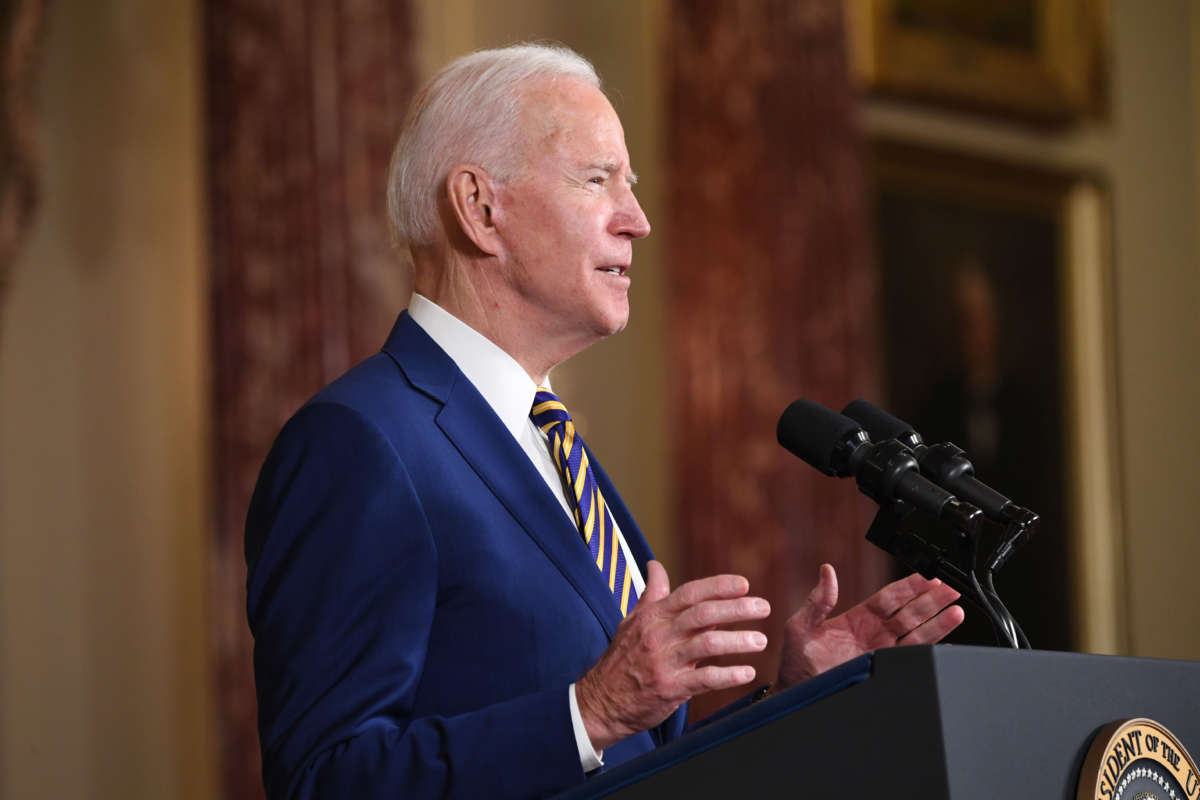President Joe Biden on Friday used numbers from a recent jobs report that showed lower-than-expected employment figures to justify passage of a swift and robust COVID-19 economic stimulus package.
While the unemployment rate dropped by 0.4 percent to 6.3 percent unemployed overall, much of that drop is attributable to the fact that people are leaving the labor force rather than finding new employment. Just 49,000 new jobs were created in January, with only 6,000 of those jobs coming from the private sector. Revisions to November and December jobs reports, too, demonstrated sharp declines.
Speaking at the White House on Friday, Biden took note of the poor jobs numbers, especially those that were created within the private sector.
“We saw the jobs report — only 6,000 private-sector jobs have been created. At that rate, it’s going to take 10 years before we get to full unemployment,” Biden said. “That’s not hyperbole. That’s a fact.”
Recounting his experience with the 2009 stimulus package he helped negotiate as vice president under former President Barack Obama, Biden warned that this is not the moment to skimp.
“We can’t do too much here. We can do too little,” he said.
Biden was critical, too, of Republicans in Congress who want to scale back the economic stimulus package that he and Democrats are proposing, the price tag of which currently sits at $1.9 trillion.
“I know some in Congress think we’ve already done enough to deal with the crisis in the country,” Biden said. “Others think that things are getting better, and we can afford to sit back, and either do little or do nothing at all. That’s not what I see.”
He emphasized that now is a crucial moment for government support.
“I believe the American people are looking right now to their government for help, to do our job, to not let them down. So I’m going to act, and act fast,” he added.
Biden, who has promoted the idea of “unity” in Washington since he took office, said that his preference was to pass a stimulus bill with bipartisan support. However, he also noted that he wouldn’t wait around to negotiate, nor would he allow the bill to be watered down.
“If I have to choose between getting help right now to Americans who are hurting so badly, and getting bogged down in a lengthy negotiation, or compromising on a bill that’s up to the crisis, that’s an easy choice,” he said.
Americans largely support Biden’s approach to passing a large stimulus bill in a swift fashion. A majority of voters in a Vox/Data for Progress poll released this week said they want a bill passed quickly, with 63 percent saying they want it to happen “as soon as possible.” Two-thirds of respondents (66 percent) also said that Congress should pass a bill “even if it means changing Senate procedure so that the bill can be passed as quickly as possible,” and 64 percent said they specifically support using the parliamentary procedure of reconciliation.
While many have been happy with the way Biden and Democrats have moved forward on this issue, some have been critical of the stimulus package for not going far enough. Rep. Alexandria Ocasio-Cortez (D-New York) noted that Biden had promised $2,000 payments to Americans eligible for direct payments in December, but changed that promise to be $1,400 payments instead, as a continuation of (rather than an addition to) $600 stimulus payments that went out under the previous administration.
“$2,000 means $2,000. $2,000 does not mean $1,400,” Ocasio-Cortez said in mid-January.
Congress is now poised to head in the direction of passing the package through reconciliation. Early on Friday morning, a budget resolution passed in the Senate by a 50-50 vote, with Vice President Kamala Harris issuing a tie-breaking ballot, in favor of moving forward with the reconciliation process, which will allow eventual passage of the stimulus bill without the threat of a filibuster from Republicans.
Join us in defending the truth before it’s too late
The future of independent journalism is uncertain, and the consequences of losing it are too grave to ignore. To ensure Truthout remains safe, strong, and free, we need to raise $46,000 in the next 7 days. Every dollar raised goes directly toward the costs of producing news you can trust.
Please give what you can — because by supporting us with a tax-deductible donation, you’re not just preserving a source of news, you’re helping to safeguard what’s left of our democracy.
